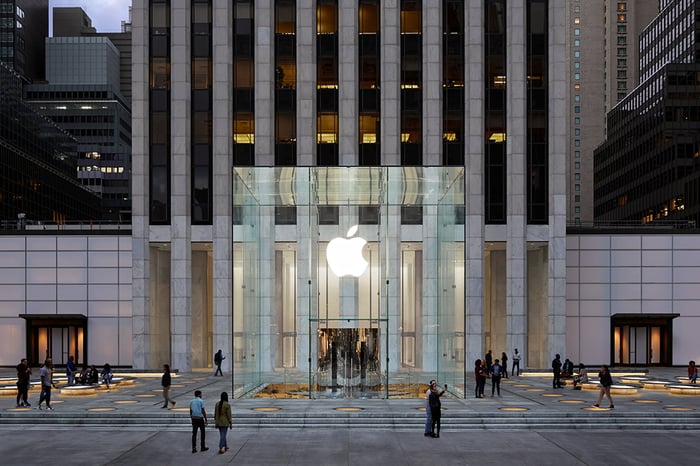Investors in tech stocks might be getting nervous as the U.S.-China trade war evolves into a full-blown tech war. However, there are still plenty of solid tech stocks that are well insulated from those headwinds, and that trade at attractive valuations.
Let’s take a closer look at three tech stocks that are “no-brainer” investment options — Cisco (NASDAQ: CSCO), Apple (NASDAQ: AAPL), and Infinera (NASDAQ: INFN).
1. Cisco
Shares of Cisco, the world’s top maker of networking routers and switches, have fallen about 10% during the past two months. Most of that drop occurred in mid-August when the company followed up a solid fiscal fourth-quarter report with soft guidance for its first quarter.
Cisco’s revenue and adjusted earnings rose 7% and 20%, respectively, in fiscal 2019. But for the first quarter of fiscal 2020, it expects its revenues to be in the flat to 2% higher range, and for its adjusted EPS to rise 7% to 9% year over year. For the full fiscal year, analysts expect its revenue will rise 2%, and for earnings to climb by 8%.
Cisco faces tougher year-over-year comparisons in fiscal 2020, as well as decelerating enterprise spending in China, the U.S., and the U.K. due to macroeconomic headwinds like the trade war and Brexit. However, its higher-growth security and applications units (which accounted for 16% of its 2019 revenues) are still generating double-digit percentage sales growth. In fiscal Q4, 70% of its software revenues came from stickier subscriptions, and it only generates a tiny sliver of its sales from China. It also expects its gross and operating margins to hold steady in fiscal Q1, even as its revenue growth slows.
Cisco still has some irons in the fire. It ended last quarter with $33.4 billion in cash and equivalents, and it recently agreed to buy Acacia Communications (NASDAQ: ACIA) — one of its suppliers — in a move that should cut costs and help it upgrade its networking device offerings for data centers. Its forward dividend yield of 2.9% and its forward P/E ratio of 13 should also set a floor under this unloved stock until the near-term headwinds fade.
2. Apple
Apple today admittedly isn’t as innovative as it was under the late Steve Jobs. It’s also still too dependent on the iPhone, which generated 48% of its revenues last quarter. But under CEO Tim Cook, it is aggressively expanding its services ecosystem (21% of its sales) with new platforms like Apple Arcade and Apple TV+ — which could generate more revenue per user as its hardware sales decelerate.
It’s also making progress in the wearables market with the Apple Watch and AirPods. Cook claimed that Apple’s wearable sales surged “well over 50%” annually last quarter, accelerating from segment growth of “near 50%” in the second quarter. The HomePod also claimed 5% of the U.S. smart speaker market in June, according to research firm CIRP.

Image source: Apple.
The initial reception for the new iPhone 11 has also been warm — even in China, where Apple is struggling with local competition, an economic slowdown, and trade war-related tensions. Cook recently told German newspaper Bild that iPhone 11 sales were off to a “very strong start.”
Analysts expect Apple’s revenue and earnings will rise 5% and 9%, respectively, next year — solid growth rates for a stock that trades at 18 times forward earnings. It also pays a dividend with a forward yield of 1.8%.
More importantly, Apple ended last quarter with $210.6 billion in cash and equivalents — which gives it plenty of room for stock buybacks, dividend hikes, acquisitions, and investments in new products. That cash cushion, along with the strength of its brand, makes Apple one of the safest tech stocks to buy for the long term.
3. Infinera
Infinera isn’t as well-known as Cisco or Apple. The optical transmission equipment maker mainly sells wave division multiplexing (WDM) systems, which let internet service providers and telecoms increase the capacity of their existing networks without laying down additional fiber — a cost-effective option for carriers dealing with the bandwidth demand that comes from the rising use of cloud-based services.
Yet Infinera’s stock price plunged from $12 in May 2018 to about $3 in July 2019. There were two key reasons for that drop. First, demand for long-haul WDM systems, from which Infinera generates most of its revenue, dried up as service providers focused on shorter-range WDM solutions like metro and data center interconnect (DCI) systems. Second, its forecasts following its acquisition of Coriant — a smaller rival which produces shorter-range WDM solutions — were initially too high.
However, the stock has rebounded by roughly 70% over the past three months as investors realized that its cyclical business was bottoming out and that the concerns about Coriant were likely overblown. Last quarter, Infinera’s revenue rose 47% annually, compared to 46% growth in the first quarter. It expects that figure to accelerate again to somewhere in the 60% to 70% range in the third quarter, and for its gross margin to expand sequentially.
Infinera remains unprofitable, but it expects its synergies with Coriant to lift its free cash flow and adjusted profits back to positive levels by the fourth quarter. If it achieves those goals, its stock could rally much higher — since its current market cap is less than this year’s sales.







